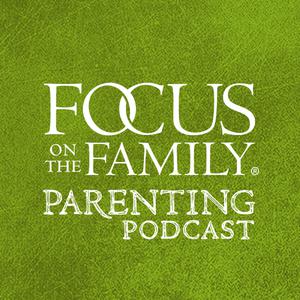
The Love and Respect Podcast
Emerson Eggerichs PhD and Jonathan Eggerichs PsyD
- 36 minutes 7 secondsEpisode 125 - Saying "Thanks" Versus Being Grateful - Part II
We can say "thanks" but not be grateful. We can mouth words but our hearts are elsewhere. We are fixated on ourselves. We have probably all seen this in ourselves. The Bible says in 2 Timothy 3:2 that people can be "lovers of self... ungrateful." We can even sing a song of thanks while in a worship service at church but inwardly dwell on the hurt and offense we feel toward someone who wronged us the day before. Join Emerson and Jonathan in part 2 this week and continuing the conversation about gratefulness but focusing on the intangible.
2 December 2016, 12:30 pm - 35 minutes 27 secondsEpisode 124 - Saying "Thanks" Versus Being Grateful - Part I
We can say "thanks" but not be grateful. We can mouth words but our hearts are elsewhere. We are fixated on ourselves. We have probably all seen this in ourselves. The Bible says in 2 Timothy 3:2 that people can be "lovers of self... ungrateful." We can even sing a song of thanks while in a worship service at church but inwardly dwell on the hurt and offense we feel toward someone who wronged us the day before. Join Emerson and Jonathan this week in this two part series which starts with how we can be grateful for the tangible things in our lives.
25 November 2016, 12:00 pm - 35 minutes 8 secondsEpisode 123 - Parenting: Chronic Anger or Chronic Appeasement? Part II
Emerson and Jonathan continue this important topic in part 2 this week, including adding a third component of apathy. What is the Issue? Children need to honor parents and show this in their respectful attitude and obedient actions. However, many parents do not always feel respected nor obeyed so they seek methods that will motivate the child to be respectful and obedient. How do we deal with this Issue? There are right ways of dealing with this and wrong ways.
18 November 2016, 12:30 pm - 35 minutes 1 secondEpisode 122 - Parenting- Chronic Anger or Chronic Appeasement Part I
What is the Issue? Children need to honor parents and show this in their respectful attitude and obedient actions. However, many parents do not always feel respected nor obeyed so they seek methods that will motivate the child to be respectful and obedient. How do we deal with this Issue? There are right ways of dealing with this and wrong ways. Join Emerson and Jonathan in Part I this week as they explore this topic.
11 November 2016, 12:30 pm - 38 minutes 47 secondsEpisode 121 - 8 Ways To Jump Off The Crazy Cycle
Join Emerson and Jonathan this week as they discuss 8 ways to prevent and get off the Crazy Cycle (see Episode 1 for a deeper explanation of the Crazy Cycle. Examples include what to do when you see the spirit of your spouse deflate, accepting some trouble as normal, and trusting in each other's goodwill.
4 November 2016, 11:30 am - 40 minutes 31 secondsEpisode 120 - The Four Seasons of Marriage - Part III
Join Emerson and Jonathan for Part III of this three part series. Why is marital paradise lost? Why do couples feel they have left Eden and live in a jungle of sorts? Since Scripture indicates couples will have trouble in this life why are husbands and wives unprepared? The answer is simple: they do not anticipate and accept the four seasons. In one way or another all couples will go through the four seasons. Those who go through them without defeat do so because they anticipate and accept the process.
28 October 2016, 11:30 am - 34 minutes 35 secondsEpisode 119 - The Four Seasons of Marriage - Part II
Join Emerson and Jonathan for Part II of this three part series. Why is marital paradise lost? Why do couples feel they have left Eden and live in a jungle of sorts? Since Scripture indicates couples will have trouble in this life why are husbands and wives unprepared? The answer is simple: they do not anticipate and accept the four seasons. In one way or another all couples will go through the four seasons. Those who go through them without defeat do so because they anticipate and accept the process.
21 October 2016, 11:30 am - 42 minutes 47 secondsEpisode 118 - The Four Seasons of Marriage - Part I
Why is marital paradise lost? Why do couples feel they have left Eden and live in a jungle of sorts? Since Scripture indicates couples will have trouble in this life why are husbands and wives unprepared? The answer is simple: they do not anticipate and accept the four seasons. In one way or another all couples will go through the four seasons. Those who go through them without defeat do so because they anticipate and accept the process. Join Emerson and Jonathan for Part I of this series.
14 October 2016, 11:30 am - 35 minutes 25 secondsEpisode 117 - Submission and Mutual Submission - Yikes!
**Jonathan's audio sounds poor and the issue was a bad cable. Our apologies.
Submission, mutual submission, headship, authority, responsibility, equality, and decision making. Join Emerson and Jonathan this week as they discuss these very lite topics which stir up very few strong emotions in people :)
7 October 2016, 11:30 am - 40 minutes 46 secondsEpisode 116 - After The "Oops" Just Apologize And Make It Right
When we miscommunicate, most people readily forgive when we ask them to forgive us. After all, they themselves have misspoken and have little interest in throwing stones. This is especially so when they see us making an honest mistake. What drives people nuts is when they feel that we spoke or wrote something that was designed to hurt or offend them, and we have no intentions of owning up to it, apologizing, and correcting our error. Join Emerson and Jonathan this as they discuss this topic and some examples of what to do if we hurt someone long ago. Also check out a recent publicized example of an apology HERE.
30 September 2016, 11:30 am - 37 minutes 35 secondsEpisode 115 - Have You Seen These Crazy Cycles Between Managers and Employees?
Men and women need love and respect as human beings in the workplace. Though there are daily demands to fulfill the mission of the organization apart from these emotional attitudes toward each other, that company will perform well when the men and women get on what I call the Crazy Cycle. Without love (care) a woman reacts without respect and without respect a man reacts without love (care). But added to this craziness is the tension between managers and employees. When employees feel unloved (uncared for) they react in ways that feel disrespectful to managers and when managers feel disrespected they react in ways that feel unloving (uncaring) to employees. Join Emerson and Jonathan this week as they discuss this new topic.
23 September 2016, 11:30 am - More Episodes? Get the App
Your feedback is valuable to us. Should you encounter any bugs, glitches, lack of functionality or other problems, please email us on [email protected] or join Moon.FM Telegram Group where you can talk directly to the dev team who are happy to answer any queries.
 Fierce Marriage
Fierce Marriage
 The Naked Marriage with Dave & Ashley Willis
The Naked Marriage with Dave & Ashley Willis
 Crazy Little Thing Called Marriage
Crazy Little Thing Called Marriage
 Focus on Parenting Podcast
Focus on Parenting Podcast
 Focus on Marriage Podcast
Focus on Marriage Podcast
 Focus on the Family with Jim Daly
Focus on the Family with Jim Daly